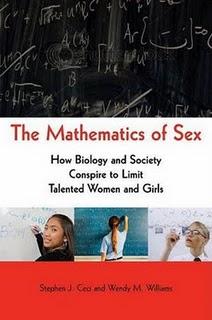The Mathematics of Sex: How Biology and Society Conspire to Limit Talented Women and Girls

I’ll be honest. I was scared of reading The Mathematics of Sex. I am not the kind of women they’re writing about, and I know very few women who are. I’m not a mathematician, physicist, chemist, computer scientist, operations researcher, or engineer. Without the subtitle, “How Biology and Society Conspire to Limit Talented Women and Girls,” the title is somewhat misleading; it’s not so much about sex between the sheets as biological sex. It’s not about the math of sex so much as the math surrounding women… or the lack of it surrounding them.
Ceci and Williams note that boys and men perform better than girls and women on standardized tests. (They use the SATs and the Putnam Mathematical Competition as examples.) Interestingly, girls and women earn better grades than boys and men in math and science classes. “For example, a man with the same SAT-M score as a woman seated next to him earns a grade nearly two letter grades lower than her in a mathematics course—he gets a C/D versus her B.” Still, even though women do better in classes, “the ranks of professionals in math-intensive fields are lopsidedly male.”
There are three supposed causes of the under-representation of women in math-heavy fields of work: comparable innate ability, social and cultural bias and barriers, and women’s lack of interest. The authors cover these arguments thoroughly in chapters two and three, which they call “opening arguments.” Then, in chapters four and five, they challenge those arguments with their own research and data.
Ceci and Williams conclude that women are not in math-intensive fields as much as men because of _non_biological/ability factors, including the tendency for “women with high mathematical talent…to enter non-math fields such as medicine, veterinary medicine, law, and biological sciences.” They analyze evidence across multiple fields of expertise: “the cognitive psychology of mental rotation, the social psychology of stereotypes, personal preferences, discrimination, and hormonal bases of behavior, econometrics of hiring and promotion, and cultural comparisons of mathematics achievement.”
Overall, The Mathematics of Sex wasn’t as scary as I expected it to be, and it was worth the read. To those people who say, “All these worrying women; I don’t know what the big fuss is,” I say: this book has the answer to why women aren’t in STEM (science, technology, engineering, and math) professions. It’s important to promote women in fields in which there are few female representatives so that future generations will continue to come to the radical conclusion that women are also human. Ceci and Williams do a good job of encouraging that in this book. Kudos.
As noted in the review, Ceci and Williams say, "the ranks of professionals in math-intensive fields are lopsidedly male.” Just how lopsidedly male? The review doesn't note the statistics in the advertising copy and the preface. These appear to be garbled versions of statistics collected by the chemist Donna Nelson.